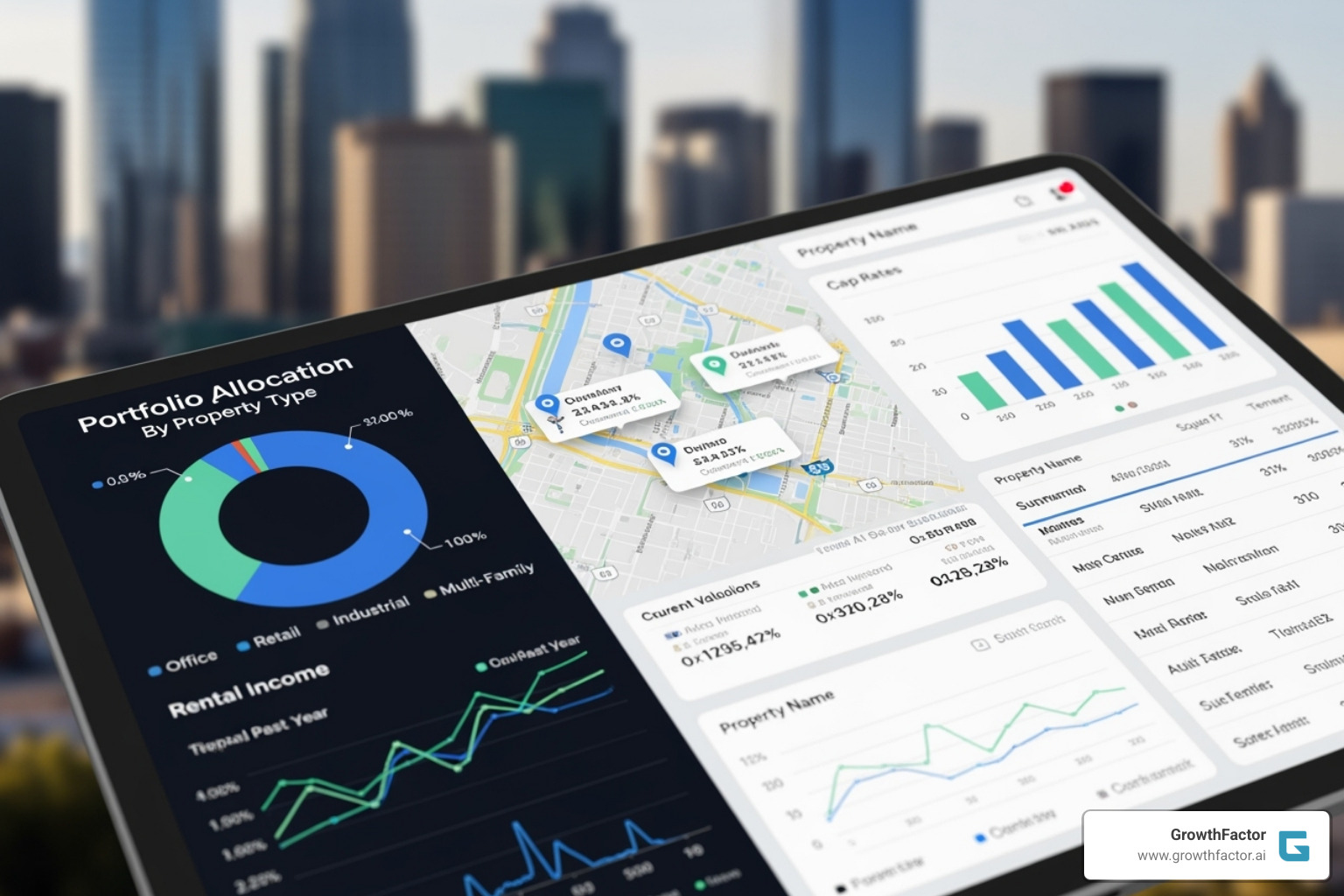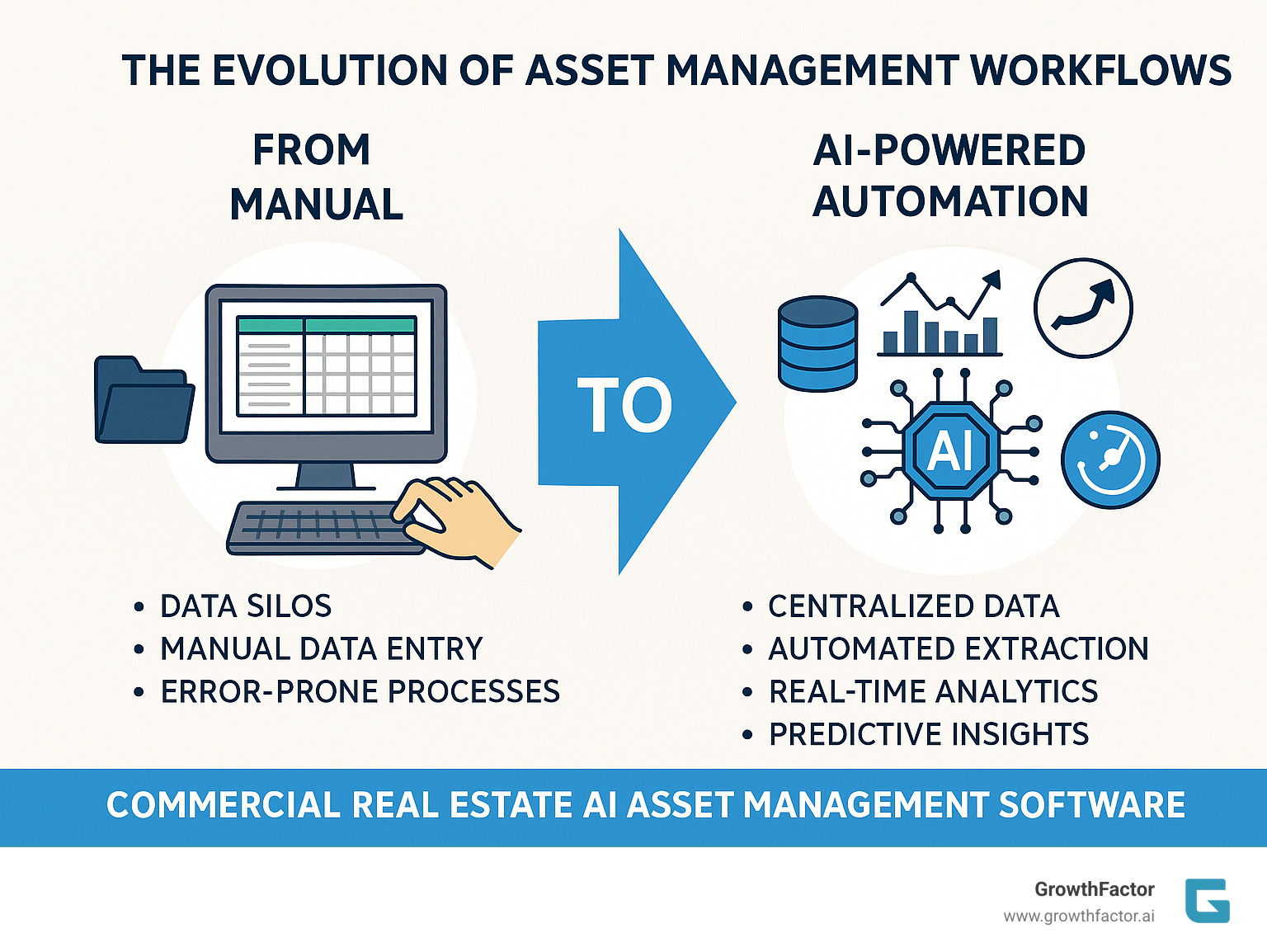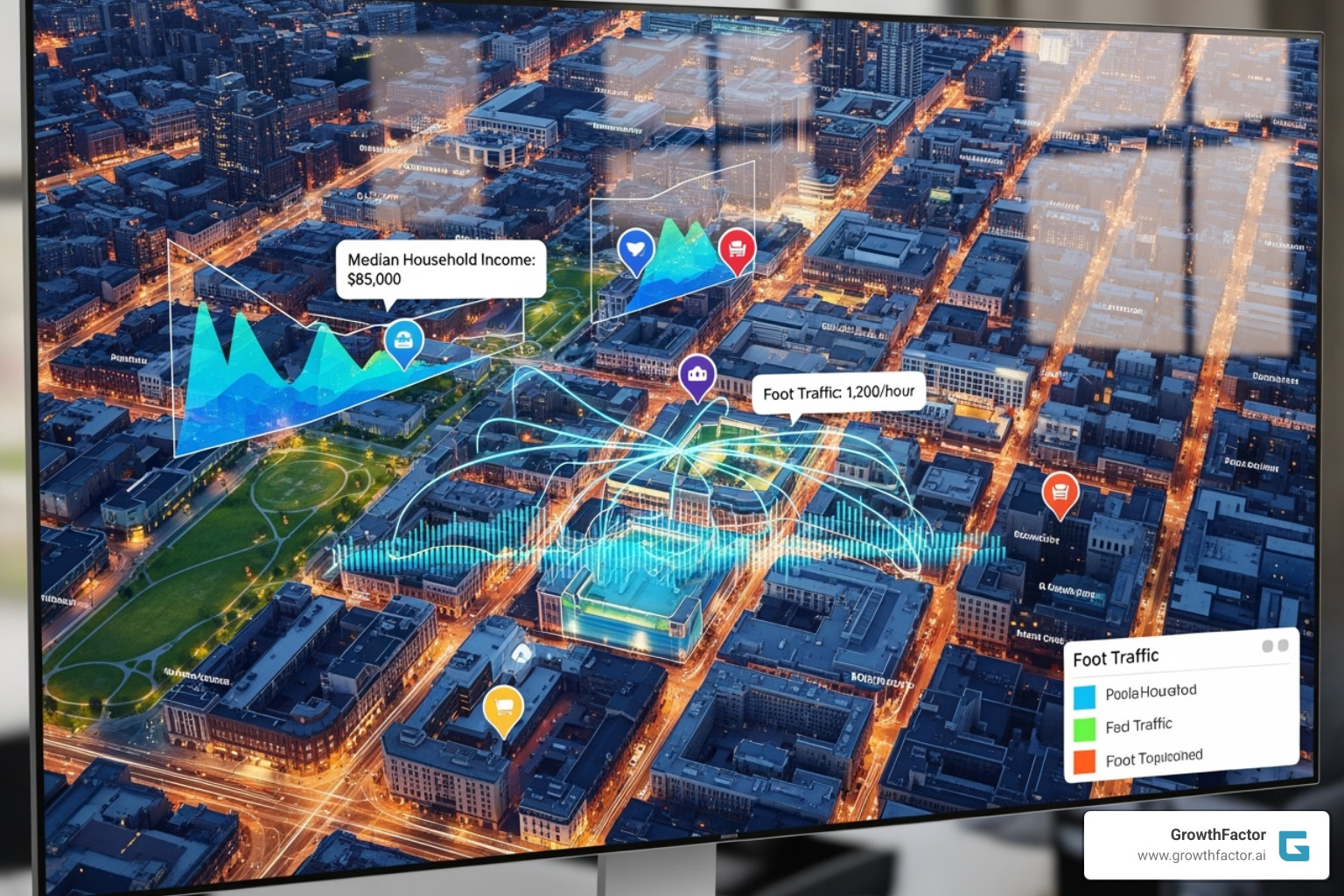The Future of CRE: Essential AI Software for Asset Management
Written by: Clyde Christian Anderson
Why AI-Powered Asset Management is Changing Commercial Real Estate

Commercial real estate ai asset management software is revolutionizing how firms manage their portfolios, with 51% of real estate executives planning to invest in AI to digitize processes. These platforms automate everything from lease abstraction to investment analysis, helping teams process more deals while reducing manual errors.
Top AI Asset Management Software Categories:
- Deal Pipeline Management - Automated data capture from OMs and broker listings
- Lease Administration - AI-powered abstraction with 99.9% accuracy
- Investment Analysis - Automated underwriting and risk assessment
- Portfolio Reporting - Real-time dashboards and investor communications
- Site Selection - Predictive analytics for location optimization
The shift from manual spreadsheets to AI-driven platforms is dramatic. Where asset managers once spent hours extracting data from rent rolls (53% of which contain material financial errors), AI can now process these documents in minutes with near-perfect accuracy.
Key benefits include:
- 37% of CRE tasks can be automated by AI
- 80% reduction in financial analysis time
- 95% improvement in data accuracy
- 75% faster decision-making processes
Commercial real estate firms using AI report processing 3x more deals while focusing more time on strategic decisions rather than data entry. The technology handles everything from lease renewals and critical date tracking to generating investor reports and identifying market opportunities.
I'm Clyde Christian Anderson, Founder and CEO of GrowthFactor.ai, where we've helped retail clients open up $1.6M in cash flow through AI-powered site selection and commercial real estate ai asset management software. Having worked in investment banking and retail real estate analysis, I've seen how AI transforms manual processes into competitive advantages.

Simple commercial real estate ai asset management software word guide:
Core Capabilities: How AI is Revolutionizing CRE Asset Management
Commercial real estate AI asset management software is changing property portfolio management. Instead of drowning in spreadsheets, firms now use intelligent systems that understand their business. With AI-Driven Analytics, teams can see the full picture instantly.
Predictive analytics helps spot trends before they become problems, such as predicting which tenants might not renew so teams can take early action. The automation of repetitive tasks is another key benefit. Morgan Stanley found that 37% of commercial real estate tasks can be automated with current AI, freeing up teams from tedious work.
Natural Language Processing (NLP) and Optical Character Recognition (OCR) work together to extract information from documents like lease agreements and financial statements, organizing the data into useful formats. This leads to improved decision-making and risk mitigation, as better data flows faster, enabling smarter choices on everything from acquisitions to tenant relations.
Automating Underwriting and Investment Analysis
Building a DCF model from scratch is time-consuming and prone to error. Commercial real estate AI asset management software automates much of this heavy lifting. AI Real Estate Underwriting platforms generate automated DCF models in a fraction of the time it takes analysts. These systems pull market data, apply risk assessment algorithms, and run sensitivity analyses faster than any human team.
Faster deal screening is possible as AI evaluates dozens of investments simultaneously, analyzing demographics and property performance to identify promising opportunities quickly. Market trend analysis is also improved as AI processes thousands of data points, from economic indicators to local development plans. This creates a competitive edge by spotting opportunities and risks missed by traditional methods. Real Estate Investment AI is valuable for teams needing to evaluate multiple deals quickly, allowing them to move confidently on the best opportunities.
Streamlining Lease and Document Management
A sobering 53% of rent rolls contain material financial errors, often because traditional lease management is a manual process prone to human error. AI Lease Management addresses this with AI-powered lease abstraction, which reads complex lease documents and extracts key information like rent schedules, escalation clauses, and renewal options with near-perfect accuracy.
Automated data extraction eliminates manual data entry, as the software reads leases and amendments and organizes the information into standardized formats. Critical date tracking becomes foolproof with AI monitoring expirations, renewal deadlines, and option periods. Lease Expiration Date Management Software ensures important deadlines are never missed. Compliance monitoring also becomes continuous, with the system flagging potential issues before they become expensive problems, helping firms stay ahead of regulatory requirements.
Optimizing Portfolio Performance and Reporting
Traditional portfolio management involves juggling spreadsheets and creating reports that are quickly outdated. Commercial Real Estate Portfolio Management platforms solve this with centralized data dashboards and real-time performance metrics.
Real Estate Data Insights become more actionable as AI identifies patterns humans might miss, automatically tracking NOI trends and providing occupancy forecasting. A major development is Generative AI for investor reports. Instead of manually crafting reports, AI generates customized communications custom to the metrics each investor group cares about most. This technology saves time and improves investor relationships by providing relevant, timely information for better decision-making.
A Guide to Essential Commercial Real Estate AI Asset Management Software Categories

Commercial real estate AI asset management software is now a rich ecosystem of specialized tools for specific CRE challenges. Understanding these categories helps firms choose solutions that align with their growth objectives. This guide focuses on the core software categories that are changing how CRE professionals work.
AI-Powered Deal and Pipeline Management Platforms
Managing CRE deals is complex, with many moving parts where details can be missed. AI-powered deal and pipeline management platforms solve this by creating a centralized deal pipeline as a single source of truth. Key features include automated data capture from OMs and broker listings, where the platform reads documents and extracts key information instantly. Workflow automation streamlines processes from sourcing to closing, while real-time collaboration keeps teams synchronized. With customizable reporting, you can generate insights for different stakeholders. This approach allows teams to evaluate more opportunities with greater accuracy and speed. For deeper insights, explore our resources on Deal Tracking Software and Real Estate Deal Tracking Software.
Intelligent Lease Abstraction and Administration Tools
Intelligent lease abstraction and administration tools are for anyone who has manually extracted data from a long lease. These AI systems process complex documents in minutes with near-perfect accuracy. Features include automated extraction of lease clauses, seamless rent roll reconciliation, and CAM audit automation to prevent missed revenue. Data verification and automatic critical date tracking prevent missed deadlines.
Key data points these systems extract include: rent amounts and escalations, lease terms and expiration dates, renewal and expansion options, operating expense details, tenant contact information, and special provisions or restrictions.
This shift to automation is a significant efficiency gain for CRE operations. Learn more in our guides on AI Powered Lease Abstraction and Lease Lifecycle Automation.
Predictive Analytics for Market and Site Selection
Location is critical in CRE investment. Predictive analytics platforms bring scientific rigor to site selection by analyzing massive datasets to identify patterns humans might miss.

Foot traffic analytics offer deep insights into consumer behavior, while demographic trend analysis identifies emerging population and income patterns. Competitor tracking helps find market gaps, and sales forecasting algorithms predict potential revenue with high accuracy.
At GrowthFactor, our AI Agent Waldo exemplifies this, enabling retail teams to evaluate five times more sites efficiently. This analytical power transforms site selection from guesswork into a strategic advantage. Dive deeper with our resources on AI Real Estate Market Analysis, Foot Traffic Analytics, and Data-Driven Site Selection.
AI-Improved Property and Tenant Experience Software
Tenant experience is a key competitive differentiator. AI-improved property and tenant experience software helps make exceptional service scalable. AI chatbots for tenant communication handle routine inquiries 24/7, understanding context and escalating complex issues to staff. Automated maintenance scheduling, often integrated with IoT sensors, predicts system needs before they fail, reducing emergency repairs. Smart building integration creates seamless experiences for parking and room booking, while personalized tenant services suggest relevant amenities based on learned preferences. Amenity usage analytics help managers optimize spaces based on actual use. This data-driven approach to tenant satisfaction builds stronger relationships and improves financial performance, shifting property management from reactive to proactive. Explore this change in our guide to AI in Property Management.
Implementing AI in Your CRE Firm: Strategy, Challenges, and Future Trends

Implementing commercial real estate AI asset management software is more than a tech purchase; it's a fundamental shift in how your team works and delivers value. This journey requires thoughtful change management as teams adapt to new workflows and trust AI insights. Key challenges include data security, integration with legacy systems, and ensuring the solution is scalable from day one to prevent future disruptions.
Key Considerations for Choosing the right commercial real estate AI asset management software
Selecting the right commercial real estate AI asset management software requires a methodical approach based on your firm's unique needs. Define your business goals first. Your specific pain points—be it manual lease abstraction or slow deal processing—should drive your selection. Assess your data readiness. AI needs clean, organized data, so understand your current infrastructure to choose a platform that can work with it. Vendor due diligence is critical. Look for providers with proven CRE track records and strong security protocols like SOC 2 compliance. User-friendliness is key to adoption; an intuitive interface ensures your team uses the software effectively. Integration capabilities via APIs are necessary to connect with existing CRM and accounting systems, ensuring seamless data flow. Finally, consider the total cost of ownership, including implementation, training, and support. At GrowthFactor, our plans are designed to scale with your firm's growth. These considerations are critical when navigating the Commercial Real Estate Tech landscape.
Emerging Trends: The Next Wave of CRE AI
The AI revolution in CRE is just beginning. Vertical AI agents are a key development. These specialized digital coworkers are built for CRE workflows, understanding industry nuances that general AI cannot. Our AI Agent Waldo exemplifies this, focusing on retail site selection to deliver superior results. Generative AI for reporting is changing investor communication, drafting custom reports for specific audiences. AI for ESG and energy performance meets the demand for sustainable investments by optimizing energy use and automating sustainability reporting. Hyper-personalization for investors uses AI to deliver customized insights based on individual risk profiles and preferences. The proptech market's projected 16% CAGR growth through 2034 reflects this innovation, with specialized applications like AI-Powered Retail Analytics showing how targeted AI delivers superior results.
The Future of the CRE Asset Manager Role
AI adoption is evolving the asset manager role, not eliminating it. By automating tedious tasks, AI frees professionals to focus on high-value activities. The shift from data entry to strategy is natural as AI handles information processing, allowing managers to focus on interpreting insights and developing proactive strategies. Relationship building with tenants and investors becomes more critical, as this human touch cannot be automated. Strategic decision-making remains a human task; AI provides the data, but managers make the final calls, requiring skills in interpreting AI outputs. Becoming an AI expert is now a core competency, meaning understanding how to direct AI tools effectively. Resources like an AI educational community for CRE are invaluable for this. This evolution is an opportunity for asset managers to operate at a higher strategic level, delivering greater value and enjoying more stimulating work.
Frequently Asked Questions about AI in CRE Asset Management
When firms first explore commercial real estate AI asset management software, we hear the same thoughtful questions repeatedly. These aren't just technical inquiries - they reflect real concerns about accuracy, fit, and whether AI can truly deliver on its promises for different sized organizations.
How does AI improve accuracy in financial modeling and reporting?
The difference in accuracy is honestly remarkable. Traditional manual processes are vulnerable to human error at every step - from typing numbers incorrectly to missing critical data points buried in lengthy documents. AI tackles this challenge head-on by automating data extraction directly from source documents like rent rolls and financial statements.
But it goes deeper than just automation. AI standardizes data formats across your entire portfolio, ensuring consistency that's nearly impossible to achieve manually. The software runs continuous validation checks, flagging anomalies and inconsistencies that even experienced analysts might overlook during late-night deadline crunches.
This systematic approach means your financial models and reports become significantly more reliable. When we consider that 53% of rent rolls contain material financial errors, the impact of AI-powered accuracy becomes clear - it's not just about convenience, it's about protecting your firm from costly mistakes.
What is the difference between a horizontal AI platform and a vertical AI platform for CRE?
This distinction is crucial when selecting the right solution for your firm. Horizontal AI platforms are the Swiss Army knives of the tech world - general CRMs, broad data analytics tools, or generic automation platforms designed to work across many industries. They're versatile but often miss the nuances that make commercial real estate unique.
Vertical AI platforms, on the other hand, are purpose-built specifically for commercial real estate. They understand CRE-specific terminology like "triple net leases" and "CAM reconciliation" without requiring extensive customization. These platforms recognize the unique workflows we use, from underwriting processes to lease abstraction requirements.
The practical difference is significant. A vertical platform knows that when you mention "rent commencement," you're referring to something different than a residential property manager would mean. This deep industry knowledge translates to more targeted and effective solutions for complex tasks like automated underwriting or lease abstraction.
Can small to mid-sized CRE firms benefit from AI asset management software?
This question touches on a common misconception that AI is only for large enterprises with massive budgets. The reality is quite different, and frankly, smaller firms often see the most dramatic improvements.
The rise of SaaS models has democratized access to sophisticated AI tools. Where enterprise software once required six-figure upfront investments, today's solutions offer flexible pricing that scales with your needs. At GrowthFactor, for example, our Core plan starts at $500, making advanced AI capabilities accessible to growing firms.
More importantly, AI can be a great equalizer. A small team using AI-powered commercial real estate AI asset management software can automate routine tasks, analyze significantly more deals, and manage assets with efficiency that rivals much larger organizations. Instead of hiring additional analysts, you can leverage AI to handle data processing while your team focuses on relationships and strategic decisions.
The competitive advantage is often more pronounced for smaller firms because they can implement and adapt to new technologies faster than larger organizations with complex legacy systems and lengthy approval processes.
Conclusion: Gaining Your Competitive Edge with AI
The change is happening right now. Commercial real estate AI asset management software has moved from the field of "nice to have" technology to an essential tool for staying relevant in today's market. It's not just about keeping up with trends—it's about fundamentally changing how we work, think, and compete.
When AI automates the tedious tasks that used to consume our days, something remarkable happens. We suddenly have time to focus on what really matters: strategic thinking, relationship building, and creative problem-solving. The data that once lived scattered across spreadsheets and filing cabinets becomes a living, breathing source of insights that guide our decisions in real-time.
The firms that accept these technologies today are already seeing the results. They're processing more deals, making faster decisions, and operating with a level of accuracy that manual processes simply can't match. They're not just working harder—they're working smarter.
At GrowthFactor, we've witnessed this change through our AI Agent Waldo. When retail clients can evaluate five times more potential sites efficiently, they don't just save time—they uncover opportunities that would have been impossible to identify manually. This is the power of vertical AI designed specifically for real estate: it doesn't just automate tasks, it amplifies human intelligence.
The question facing every CRE professional today isn't whether AI will reshape our industry—it's whether you'll be leading that change or scrambling to catch up. The technology exists. The proven results are there. The only variable left is your decision to act.
The future belongs to those who combine human expertise with AI capabilities. The time to start that journey is now.
Find how GrowthFactor's AI-powered platform can transform your real estate strategy.
Citations
The human algorithm
Request Your demo
Schedule meeting
Or submit your information below and we'll be in touch to schedule.


